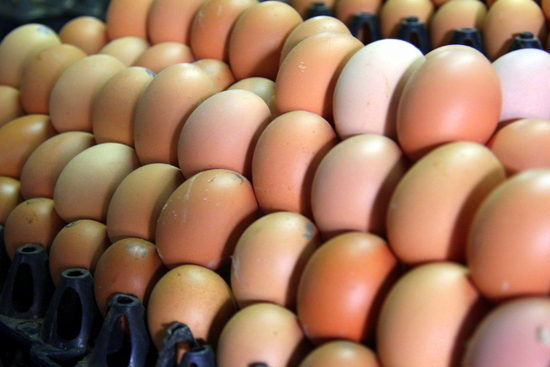High Foreign Exchange Rate Driving Up Price of Eggs
Source: Vientiane Times
The high foreign currency exchange rate, resulting from the weak kip, is the main reason for the rise in the price of consumer goods in Laos, as almost everything needed for production has to be imported.
Eggs are one of the many products that have been affected by price rises. Although the government controls the price of eggs, the cost of the popular household staple has increased because of the rising price of poultry feed, egg producers say.
The price of eggs is highly dependent on exchange rates, the owner of the NCG farm, Ms. Xaythany Chanthavongsa, told the Vientiane Times at the Vientiane One District, One Product fair held at Lao-ITECC last week.
The price of eggs has increased from 35,000-38,000 kip per box at the end of last year to 63,000-65,000 kip, almost doubling the cost.
If the kip/baht exchange rate rises unfavorably several times a month, the cost of chicken feed will also increase because almost all inputs needed to produce the feed are imported, she said.

Poultry farmers and egg producers are hampered by increasingly high production costs.
Ms. Xaythany said egg producers make a profit of just 2,000 kip on a box of 30 eggs but middlemen can earn 10,000-12,000 kip a box, which also drives up the price.
Lao egg producers are also struggling to compete with eggs imported illegally from neighboring countries such as China, Vietnam, and Myanmar.
Domestic egg producers will not be able to operate a viable business if customs officials at border crossings do not crack down on illegal imports, Ms Xaythany said.
“If we have to sell our eggs at the same price as those imported illegally, we can’t make a profit.”
Although the government is providing low-interest loans for domestic producers, in an attempt to bolster the volume of locally produced goods for market sale, strict measures must be enforced to stop illegal imports and limit the import of goods that can be produced in Laos, she added.
“In addition, we would like the government to open a window for the export of eggs, pork, and chicken meat, because exports will earn foreign currencies that would help to defray the costs involved in purchasing raw materials and enable us to expand our business,” Ms. Xaythany said.
Lao egg producers could supply sufficient eggs to meet the needs of markets in Vientiane and the provinces, she added.
There are currently three chicken farms that supply organically produced eggs to local markets. These produce 12,000 boxes of eggs a day and there are plans to create more of these large-scale farms to ensure egg supply remains strong.
In addition, numerous small chicken farmers across the country supply eggs to markets and individual vendors.
The export of organically produced eggs would not affect the domestic market but would reduce competition among large and small-scale farmers, Ms Xaythany said.
“If we could get an export quota from the government, we could export 70 percent of the eggs we produce and sell the other 30 percent to markets in Laos,” she added.
Producing more goods for export is a win-win situation for everyone concerned, as it will bring in much-needed foreign currency and help to strengthen the value of the kip against other currencies.

